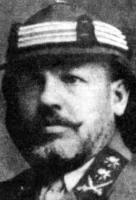Rida Pasha al-Rikabi
| Rida Pasha al-Rikabi رضا باشا الركابي |
|
|---|---|
 |
|
| 3rd and 6th Prime Minister of Transjordan | |
|
In office 3 March 1924 – 26 June 1926 |
|
| Monarch | Abdullah I |
| Preceded by | Hasan Khalid Abu al-Huda |
| Succeeded by | Hasan Khalid Abu al-Huda |
|
In office 10 March 1922 – 1 February 1923 |
|
| Monarch | Abdullah I |
| Preceded by | Mazhar Raslan |
| Succeeded by | Mazhar Raslan |
| Prime Minister and Military Governor of Syria | |
|
In office 1 October 1918 – 14 December 1920 |
|
| Monarch | Faisal I |
| Preceded by | Office Establishment |
| Succeeded by | Hashim al-Atassi |
| Personal details | |
| Born | 1864 Damascus, Syria Vilayet, Ottoman Syria, Ottoman Empire |
| Died | May 25, 1943 (aged 78–79) Damascus, Syria |
Ali Rida Pasha al-Rikabi (Arabic: علي رضا باشا الركابي) (1864 – 25 May 1943), was the First Prime Minister in modern Syria, also Prime Minister of Jordan.
During the last phase of Ottoman rule in the Middle East, al-Rikabi occupied prominent positions. After the Ottoman Turks departed from Arab lands in 1918, he formed the first cabinet in the history of Syria under Prince Faisal, third son Sharif Hussain of Mecca. Later, during two periods (1922 and 1924-1926) as Prime Minister in Jordan, al-Rikabi established Jordan’s administrative and financial system. He supported the Syrian revolt of 1925 against the French Mandate while he was Prime Minister of Jordan.
Ali Rida Pasha al-Rikabi came from a Damascene family whose ancestor had migrated from al-Rifa’i in southern Iraq during the seventeenth century. Al-Rikabi obtained his primary education at the Rushdiya Military School and completed Secondary school in Damascus also. His extraordinary performance at school earned him recommendations to be sent to the Military College in Istanbul, where he studied military engineering and graduated as the youngest in his class with the rank of Staff Major. He was later appointed military commander of the Ottoman army and deputy governor in Jerusalem. When the Ottoman Constitution was proclaimed in 1908 he was appointed Head of Special Branch in Istanbul. From there he was transferred to al-Medina al-Munawara where he was appointed Governor and Military Commander after being promoted to the rank of Major General. He then went on to Iraq as Military Commander in Baghdad and Governor of Basra.
On the eve of the First World the Ottoman Government consulted him, among other army commanders, about his opinion of Turkey’s participation in the war along the side of its German ally. Al-Rikabi advised the Ottoman Government to remain neutral in this European conflict because he was well aware of the poor condition of the Ottoman Army, its outdated weapons, insufficient ammunition and weak training. This advice led the ruling Triumvirate (Enver, Talat & Jamal), leaders of the Young Turks, to consider al-Rikabi a defeatist; so, he was dismissed into retirement from the army. Other officers and members of the Young Turks were enthusiastic in their drive to enter the war on the side of Germany, their friend and ally. When al-Rikabi returned to Damascus after his dismissal, Jamal Pasha appointed him Mayor of Damascus and Chief of Defences in order to utilise his knowledge and experience, while keeping him under close surveillance. Al-Rikabi preferred to accept these two positions to ward off suspicions, as he was in fact one of the founders of the first two secret organisations that planted the seeds of Arab Nationalism under Ottoman rule, namely ‘The Young Arab Society’ and ‘The Covenant Society’.
...
Wikipedia
